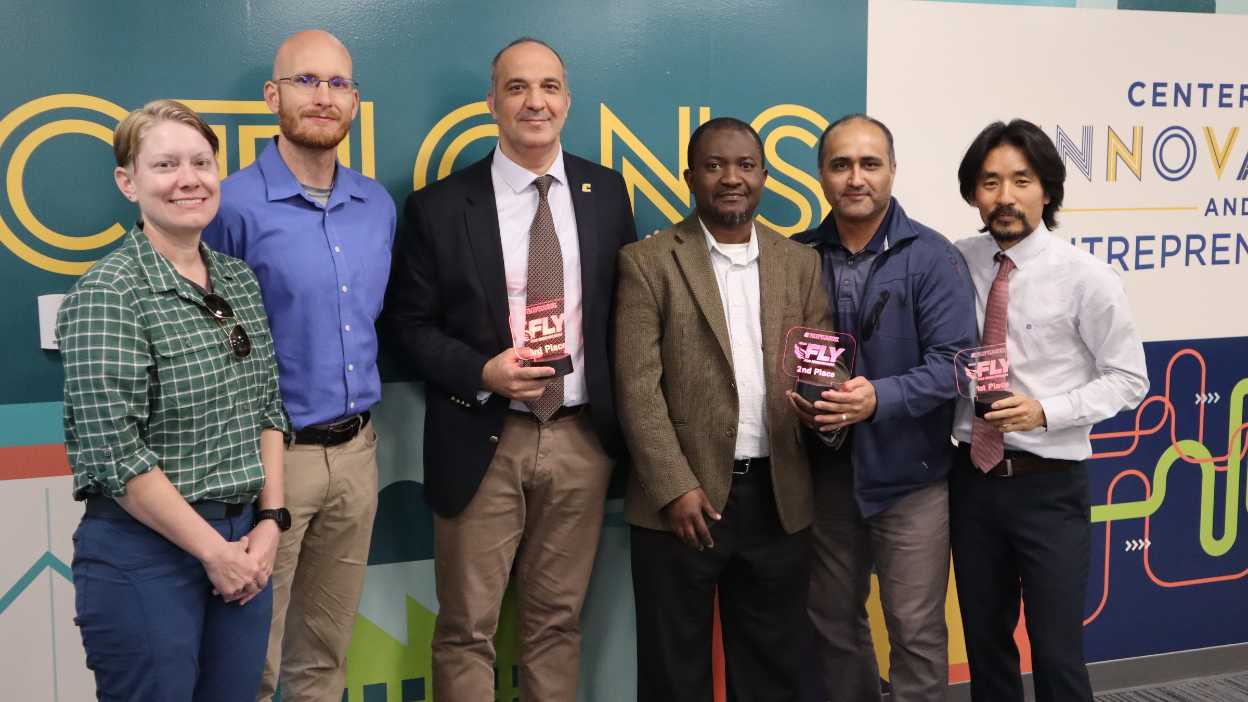
Gel for retrofitting single-pane windows captures two prizes in UTC pitch competition
The second annual "Fly for Researchers Faculty Pitch Competition" featured five faculty start-up ideas that have significant commercial potential.
Aerogel has been used to make windows more energy-efficient for less than a decade. Sungwoo Yang believes he can make it better.
It was his confidence, a well-constructed PowerPoint presentation and easy-to-understand answers to questions that earned the Assistant Professor in the Department of Civil and Chemical Engineering at the University of Tennessee at Chattanooga (UTC), the first-place finish in the second annual “Fly for Researchers Pitch Competition.” By winning, Yang will receive $20,000 to apply to research on what he calls Aerogel 2.0 – “the next generation of aerogel” – with the hope of eventually making it available on the commercial market.
Aerogel is a porous gel in which all the water has been removed, leaving a translucent, ultralight material that is very insulating and heat-resistant. It can be made from several chemical compounds; Yang’s is created from silica, the primary element in sand.
“The prize money for this competition will be mainly used for scaling up development,” he said. “Every step matters, so there’s room for us to play. There’s so many parameters we can play with.”
Yang bested four other teams of UTC faculty members and students who were given five minutes to present their research ideas, then eight more minutes to answer questions from a panel of three judges. The event was held on Wednesday afternoon in the UTC Center for Innovation and Entrepreneurship (CIE).

Previously a faculty member at the Massachusetts Institute of Technology, Yang worked on aerogel development there. “This new gel is made by the recipe that I developed at MIT, he said, adding that Aerogel 2.0 would provide more thermal insulation at a lower cost than the current version of aerogel – $1 per square foot instead of $3 per square foot.
Aerogel 2.0 will come in flexible sheets that can be cut easily to fit different sizes of windowpanes, he said, and its adhesive will be strong enough to hold it in place, but not so sticky it will be difficult to remove.
“What I’m thinking is you, as a customer, go to Home Depot, you buy this product, put it in the trunk and come back home,” Yang said. “With the knife you cut it, then you apply it to the adhesive or maybe it has a magnetic system. It’s easy to apply.”
While Aerogel 2.0 is his focus now. “I’m already thinking about Aerogel 3.0,” Yang said.
Second place and $10,000 in the competition went to SolarEagle, a drone-based artificial intelligence system that will detect and assess damaged solar panels—cracks, corrosion, thick layers of dust, for example—to ensure performance and longevity. Manual labor will not be needed, said team leader Abdul Ofoli, UC Foundation Associate Professor of Electrical Engineering who joined with colleague Vahid Disfani, an Assistant Professor of Electrical Engineering.
Third place and $5,000 went to a team headed by Erkan Kaplanoglu, Associate Professor in the Department of Engineering Management and Technology, which is developing PactBB, a machine-operated platform that measures the muscular control of patients with balance and mobility problems due to chronic low back pain. Data from the platform can be used to treat the physical issues.
Along with Kaplanoglu, the rest of the team included Max Jordon, Assistant Professor of Physical Therapy; Lynette Carlson, Assistant Professor and Athletic Training Clinical Education Coordinator; Jeremy Bruce, Orthopedic Surgeon at Erlanger Hospital; and Ahad Nasab, Professor and Head of the Department of Engineering Management and Technology.
The winners are pictured above and are (left to right): Carlson, Jordan, Kaplanoglu, Ofoli, Disfani and Yang.
The three monetary prizes were funded by the UT System and the Office of the Vice Chancellor for Research.
In addition to the main Fly for Researchers Pitch Competition, audience members voted for their choice as the best project, with the winner receiving $2,000. Aerogel placed first in that competition, too.
The Audience Choice award was funded by the Clarence E. Harris Chair of Excellence in Entrepreneurship in the Gary W. Rollins College of Business and LaunchTN.
Judges were Rebekah Sharpe, Founding Partner of Transparency Health, a venture capital company; Kristina Montague, Managing Partner of The JumpFund, an all-woman investing firm; and Tasia Malakasis, Chief Executive Officer of CO.LAB.
Taking research projects beyond the laboratory is a goal of the “Fly for Researchers Pitch Competition,” said Jennifer Skjellum, UTC Commercialization Counselor who organized the competition.
“It’s not just about basic research or a paper,” she said, “but figuring out, ‘How is the work that I’m doing going to have an impact on my community, on society, on the world?’”
Like what you've read?
Forward to a friend!

